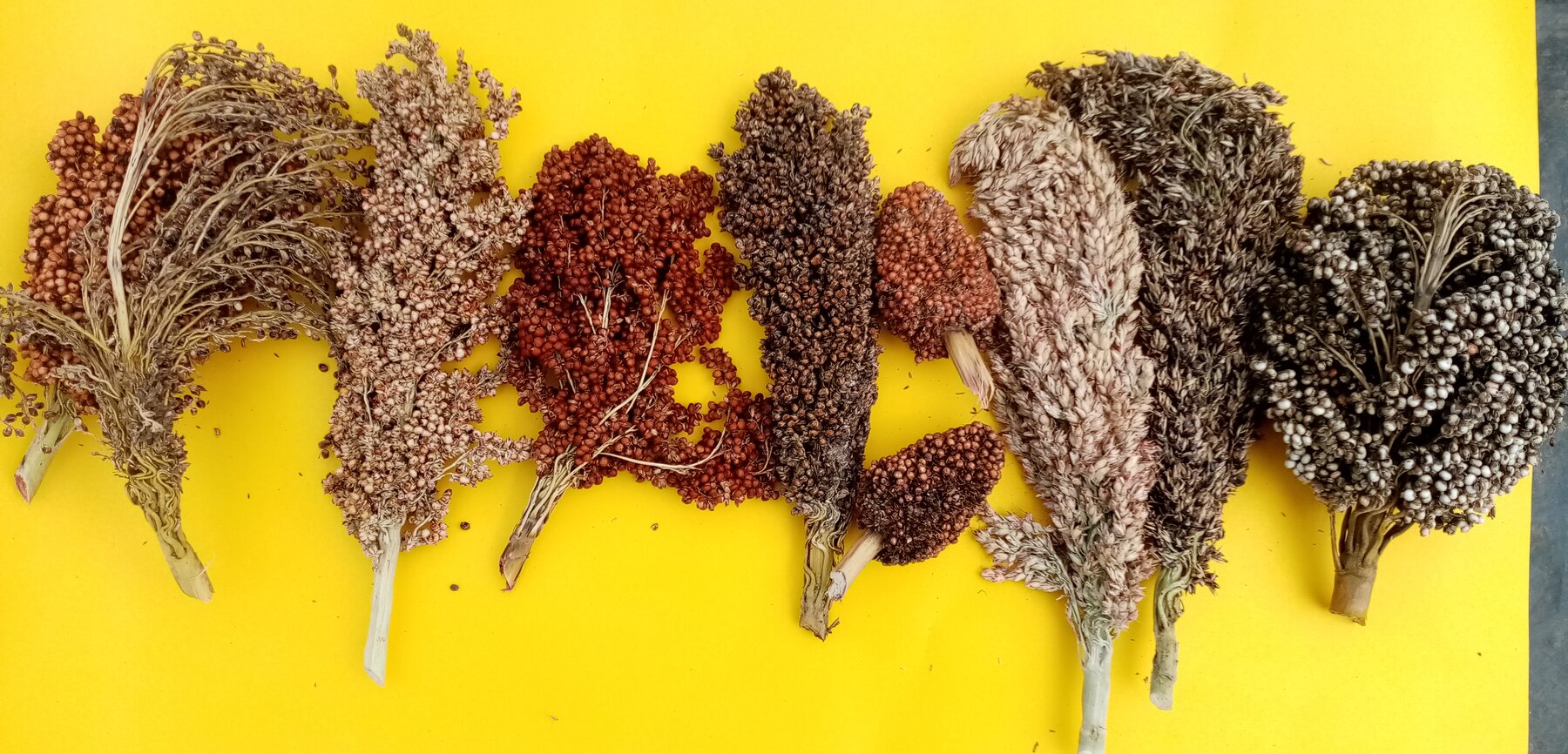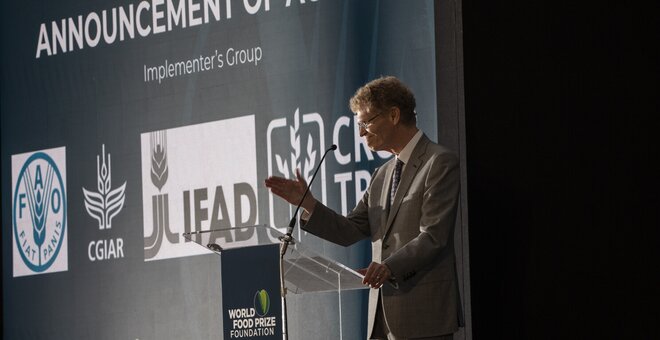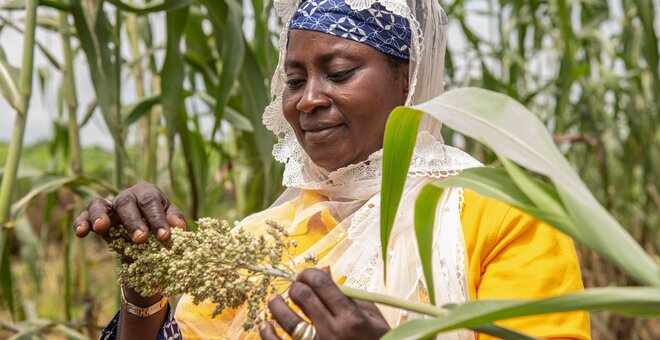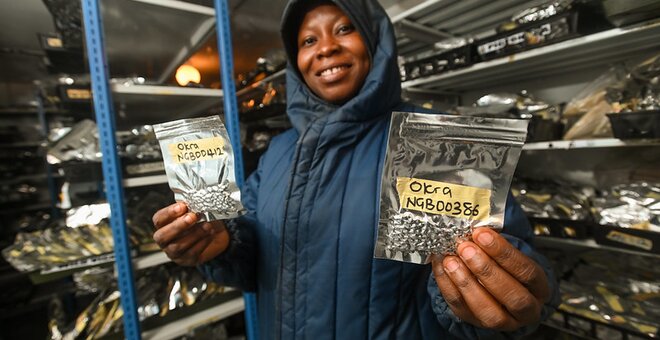Building a Resilient Future With the Vision for Adapted Crops and Soils (VACS)
Start year: 2023
The global food system must be able to withstand challenges. Its vulnerabilities are intensified by climate change, environmental degradation and geopolitical tensions, impacting food and nutritional security around the world. We must take a transformative approach to prepare for a more resilient future, adapt our agricultural systems to the impacts of climate change and enhance sustainability in food production.
The Vision for Adapted Crops and Soils (VACS) is an initiative launched by the United States Department of State in February 2023 in partnership with the African Union and the Food and Agriculture Organization of the United Nations (FAO). Starting with Africa, VACS seeks to adapt agricultural systems to the anticipated challenges of climate change through a dual focus – below ground and above ground.
Below ground means building healthy, fertile soils capable of retaining water and mitigating drought. VACS seeks to rebuild depleted African soils, including with soil maps that help policy makers and farmers determine which crops can grow where and with appropriate farming techniques.
Above ground means developing and growing crops that are better adapted to the challenges posed by climate change, such as higher temperatures, increased pest and disease pressures, and extreme weather conditions. These “opportunity crops” are important culturally, nutrient-dense, resilient and well-suited to marginal conditions. However, they are often neglected by researchers and policy-makers. They need a helping hand.
The VACS Implementer's Group serves as the primary platform for coordination and collaboration among organizations that advance the goals of VACS. It includes the Food and Agriculture Organization of the United Nations (FAO), CGIAR, the International Fund for Agricultural Development (IFAD), and the Crop Trust. The group focuses on aligning efforts, maximizing collective impact, and promoting transparency.
The Crop Trust is a VACS Champion and a member of the VACS Implementer's Group. The Crop Trust is an international non-profit organization committed to safeguarding the world’s crop diversity in genebanks, which underpins efforts to adapt crops to changing climates, improve yields, and ensure food security and nutrition.
The Crop Trust contributes to VACS in multiple ways, through projects and other activities:
Global Crop Conservation Strategies
Since 2007, the Crop Trust has facilitated the development of 41 global crop conservation strategies by experts around the world. These strategies provide details about existing genebank collections of crop diversity, including the status of their conservation, availability, accessibility and use.
Information and recommendations from the strategies can be used by genebanks and policymakers to help ensure that these important crops and their wild relatives are secured in a cost-effective and sustainable manner for the long-term future. Current efforts focus on mainstreaming the strategies into International Plant Treaty processes to improve the global coordination of priority conservation activities among genebanks and their users worldwide.
There are global conservation strategies for the following opportunity crops:
- Barley
- Brassica (including Ethiopian mustard)
- Breadfruit
- Cassava
- Chickpea
- Cowpea
- Cucurbits (including bottle gourd, luffah and bitter gourd)
- Edible aroids (including taro)
- Eggplant (including African eggplant)
- Faba bean
- Finger millet
- Grasspea
- Lentil
- Millets (including finger millet and pearl millet)
- Pea
- Sorghum
- Vigna (including mung bean/green gram, Bambara groundnut and cowpea)
- Yam
Genesys
Genesys is an online platform that allows users to explore the world’s crop diversity conserved in genebanks through a single website, helping them identify seeds that meet their needs and connect to relevant genebanks to obtain samples for research, training and breeding. Genesys holds valuable data on many of the VACS priority crops, such as different cereals, roots and tubers and vegetables.
BOLD
Biodiversity for Opportunities, Livelihoods and Development (BOLD) is a 10-year project with the aim to strengthen food and nutrition security worldwide by supporting the conservation and use of crop diversity. BOLD supports 15 national genebanks worldwide to conserve their existing collections, develop new crop diversity through partnerships with breeders, and collaborate with farmers to use that diversity in their fields.
BOLD partners carry out activities that support the breeding of improved climate-adapted varieties of finger millet, barley, and grasspea, improve farmer access to these varieties, and build value chains.
BOLDER
The Crop Trust contributes to VACS through its BOLDER (Building Opportunities for Lesser-known Diversity in Edible Resources) project by helping to put different opportunity crops back on the menu in four African countries: Benin, Ghana, Uganda and Tanzania.
In the first phase of BOLDER, Crop Trust and partners will work closely with local stakeholders in each country to prioritize species that best fit farmers’ needs in different regions, secure their diversity, and document their key characteristics in close collaboration with farmers.
Seeds for Resilience
Seeds for Resilience is a five-year project to support the national genebanks of Ethiopia, Ghana, Kenya, Nigeria and Zambia. Its activities include upgrading genebank equipment, improving internal processes and increasing staff technical capacity.
Thousands of important plant samples, many of which are opportunity crops, are shared with farmers and other users through participatory trials, where they can select the seeds best suited for their local conditions and needs.
The Seeds for Resilience project includes work on barley, sorghum, faba bean, enset, teff, finger millet, pearl millet, green gram, cowpea, sweetpotato, cassava, Bambara groundnut, African nightshade, Jute mallow, okra and yam.
Founding Partners
-
U.S. Department of State
-
African Union
-
Food and Agriculture Organization of the UN (FAO)
Related News
Crop Trust Joins VACS Implementer's Group to Strengthen Response to Global Hunger and Malnutrition With Opportunity Crops
Texcoco, Mexico, July 11, 2024 – The Crop Trust, a global organization dedicated to the conservation of crop diversity, is proud to announce its membership in the Vision for Adapted Crops and Soils (VACS) Implementer's Group. The...
11 Jul 2024
A ‘Revolutionary’ Way to Feed the World That’s Very Old
As the State Department’s global envoy for food security, Cary Fowler is working to shift U.S. foreign policy towards promoting traditional crops like cowpeas, cassava, and millets in developing countries. He labels them...
23 Jan 2024
Crop Trust dares to be BOLDER with expansive initiative in Africa
Dubai, United Arab Emirates, 10 December 2023 — As the world comes together to urgently chart a better course forward for climate action at COP 28 in Dubai, the Crop Trust is proud to announce the launch of the BOLDER (Building...
10 Dec 2023




